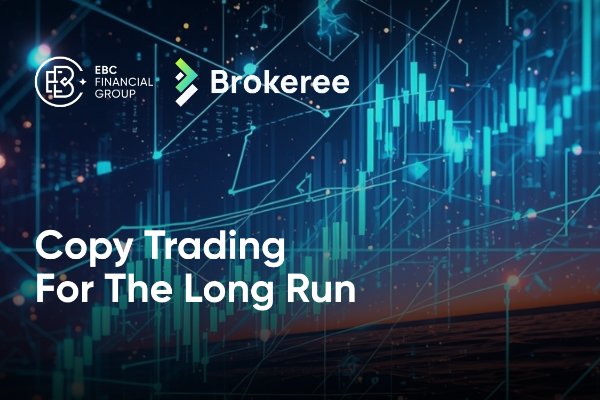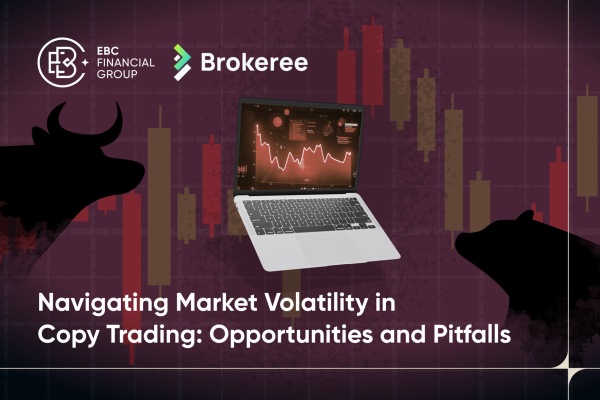Finance Magnates is a renowned global technology and finance media outlet
known for its extensive news coverage and high creditability.
In an exclusive interview with it in early November, David Barrett, CEO of
EBC Financial Group (UK) Ltd., expressed his latest view on the impact of Fed
interest rate hikes and geopolitical instability on asset pricing and
allocation, the prospect of energy investment, as well as how AI technology has
benefited both retail traders and brokers.

Interest rate hikes, unexpected regional wars
We have seen a consistent rise in Treasury yields in the second half, which
is weighing on investor sentiment. Will they continue to head higher? Would the
interest rate hike affect the assets classes, and how?
It might seem that rates have only been on the move this year but it’s
important to realise this has been going on since March 2022, when the Fed first
started to hike. Eleven hikes later we have seen the Fed target rate range move
from 0.25/0.50% to 5.25/5.50%, by any standards this is a massive move in such a
short period of time. I suspect many people miss the point that rates are not
high, by historical standards, they are simply higher than the market has been
used to in the recent past.
Comments from the Fed indicate that near term hikes are likely done until
they see more of the lagging effects of the previous hikes on the economy, I
would tend to agree. But I do see a ‘higher for longer than the market might
like’ type scenario playing out and I do not dismiss another round of
inflationary pressure; especially given the abundant global risks we have
now.
Considering what we have seen of late - rates, geopolitical tensions,
inflation to name a few - you would be forgiven for thinking risk in general has
held up better than many expected. We have just started to see a few cracks in
stocks, credit, and housing but as the longer-term effects of the hikes play
through the economy I am firmly in the ‘it’s not fully priced in yet camp’.
Being able to earn 5% risk free in cash as we see the geopolitical tensions
unfold doesn’t seem like the worse trade in the world.
We see the unexpected Israel-Hamas warfare amid the continuing
Russo-Ukrainian war. The risk of regional instability is at another new height,
how does it affect the the individual/institutional investor's choice of
investment and the asset allocation?
As touched on above having a risk-free rate of 5% will make individual and
institutional investors think twice about being exposed to price and news risk
to the extent they have been in the recent past. I would consider a lower risk
exposure and a higher cash allocation to be prudent at least into year end.
I suspect those asset groups that have massively over performed this year,
the ‘Magnificent Seven’ stocks would be a great example, will see some profit
taking. The risk with these being that they are so heavily owned that any
repricing could become very volatile.
Has inflation come to an end…or not?
Some analysts think oil prices could hit $100 by the end of 2023. Do you
think that it could happen? Would it accelerate investment in replacements i.e.
green energy tech and its relevant industries like battery, solar panel and raw
materials like lithium and cobalt?
Even before the present global tensions OPEC’s supply cuts have squeezed oil
prices higher. I suspect the real answer to the question is almost totally
dependent on the way the situation in the Middle East unfolds. For now, the
market is remarkably resilient to the news cycle as it appears to be waiting to
see if the conflict widens to other actors – Iran in particular. Should that
happen I worry that price discovery for that additional risk could be very harsh
indeed.
Higher fossil fuel prices always have a knock-on effect to renewables and the
component prices. For me the short-term pricing is very much a speculative event
– no renewable project be it solar, EV, Hydrogen or any other sector has a short
term pay off. These are all huge long term investment projects and investors
should be involved only if they have the stamina to stay the course.
Green Tech investment allocation is being driven by government subsidies and
higher rates. Massive US subsidies have attracted a lot of the investment, that
had been centred in other regions, into their economy. Given my view on needing
to take a longer-term view, projects in those countries that can write the
cheques will keep the institutional investors’ attention. As with many markets
in a more stressed environment, large well-funded balance sheets will be a draw
for investor flows.
Inflation continues to cool gradually across major economies but central
banks remain cautious. Would that factor still be our primary consideration in
investment decision heading into 2024?
For me global interest rates will remain the main driver in most markets for
at least the first half of 2024. The market is pricing in cuts to start mid-year
as the effects of the past rate hikes have the desired effect on the economic
data. Any sustained dip in inflation that encourages this thought will make risk
assets attractive again.
For me there are far too many variables out there now to make that call. Core
inflation remains a lot more suborn than many would like, the Middle East and
Ukrainian tensions could easily spark an energy price spike and broader trade
tensions between the West and China rumble on. It is also easy to forget that we
have a US election coming up in 12 months and the prospect of a change of
administration in the White House could spark higher tensions as we have seen
previously.

Global Market Outlook 2024
It is predicted the tech stocks would underperform in 2023. Are they now
fairly valued after a pullback over the last two months? Is it time to buy the
dip?
The ‘Magnificent Seven’ stocks have made index watching a little skewed this
year, their rally in the first half was nothing short of astonishing. My call,
in Q2, for tech to underperform was clearly too early in terms of the QQQ index
but globally Asian Tech, Cyber Tech, Fin Tech and Software Services have not
kept up.
At the time of writing, we are seeing the results season show that not all
the leading Big Tech firms have a strong outlook for 2024 and their prices have
been slipping. I expect nothing will move in a straight line for the rest of
2023 and into 2024 but I remain wary of technology as a sector. I think there is
more value to be had elsewhere.
Technology is a sector that gets more things wrong than it get right as it
innovates and looks for new products. The last two decades have allowed the
sector to boom on free money – the cost of getting it wrong has been small
enough that they just kept going – this has changed and the risk appetite to
take on a much higher cost to find innovation will stall the sector.
I suspect the ‘Magnificent Seven’ have been the main beneficiaries in the
sector exactly because they have those very strong balance sheets that can
weather the rising cost of using them better than the small more innovative
firms.
The Japanese yen eyes 150 per dollar, putting traders on alert for forex
intervention. Why have not Japanese officials stepped in? Does JPY lose its
haven status?
I suspect the authorities have been involved in DlrYen, smoothing the price
action when they deem it to be to one way. The anonymity that single and
multi-bank platforms give these days means they can do this with less fanfare
than they might have before.
The reality for the market, the Japanese Government and the Central Bank is
that Yen has always been heavily driven by yield differentials. The Bank of
Japan Yield Curve Control policy means that the USD yield moves have created a
very attractive carry trade. It is perfectly logical for the market to have been
buying the Dlr and in particular DlrYen up to these levels. 150 has no real
significance as a number it is more phycological than material.
There is no point conducting huge intervention to ‘protect a level’ – they
have learned that lesson over many years. Intervention can hurt speculative
flows in the short term but it will not change the main driver of the Dlr buying
– yield differentials. If they want to change that they will need to revise
their YCC policy. This may well be coming as local data is showing growing signs
of inflation but the authorities do not seem to be in a hurry to untie the
complicated knot they have made for themselves.
The risk reward of being short Yen at these levels is definitely less than it
has been but I think that is more about the chances of a policy move coming than
it being at 150.
The Yens safe haven is a strange one for me, previously I might have been
convinced but now I am not sure it really qualifies. The FX rate is more
volatile, it causes pressures in the economy and its reliance on importing
energy keeps it vulnerable. The fact that the Yen is this weak given the global
risks that exist says a lot about the safe haven status it might have.
We see the outbreak of generative AI and the massive adaption of AI
technology on every trade in 2023. Algorithm trading is also a growing trend,
too. Is it a good trend or disaster if more traders turn to or increase their
reliance on algorithm trading?
At the moment I would suggest the majority of Retail clients trade using
algorithms, be that copy trading or using Expert Advisors. As a broker that sees
this kind of flow via our clients it is clear it creates herding instincts in
many trades. We see many clients with the same / similar trades and the timing
of entry and exit can be very similar – especially in moving markets.
Institutional clients use them mainly as execution tools – trying to avoid
adverse market moves while they execute large flow into the market.
If you look at how the main ‘real’ liquidity providers manage their risk
these days I can see this building up to become a real issue as we get higher
realised volatility in markets. Real market makers are now trying to warehouse
as much short-term risk as they can. The basic principle being that they see
enough two-way flow to allow them to trade out of risk each side of the price,
thus reducing hedging friction costs and capturing spread income.
They tend to hold risk for given windows of time, they have the capability to
analyse each client’s ‘quality’ of flow and the profile of what happens to the
price from the moment the client executes a trade. This is why many have become
very sensitive to difficult flow – they want the decay of the price to remain
stable for as long as possible, post execution, so that other clients are able
to take them out of the risk and create spread income.
This works well in stable markets but anything that reduces that window of
time (news, large flow or tricky client flow) means they have to hedge out of
the position they hold sooner than they would like. The more market makers that
adopt this risk management the more sensitive the price is to them being forced
to hedge.
In many ways this means they are all running short volatility by default –
great in a low volatility environment, but not great as volatility rises as we
are seeing now. We have seen real volatility in bond markets for sure, stock and
commodity markets have their moments and FX has been very quiet in comparison.
Risk managers have the jeopardy of becoming too systematic in the way they
manage exposure when all is going well, the real test comes when real volatility
hits all sectors of the market.

About David Barrett
David Barrett is the CEO of EBC Financial Group (UK) Ltd, his career in
financial markets spans 35 years, during which time he has found several
consultancy business. With a background in foreign exchange, fixed income,
commodities and derivatives, Barrett has held sales and trading roles for
financial institutions including AIG, NatWest, ABN Amro and Nomura.
About EBC Financial Group
EBC Financial Group has cemented its role as a leading entity in the
financial industry. Its teams are comprised of interdisciplinary and
multilingual experts, specializing in the global financial technology field. The
group's core team members possess over three decades of industry experience, and
they have worked for large securities firms, investment banks, exchanges, etc.
It is committed to offering a trustworthy and foolproof online trading service
to its diversified clients across the globe.













